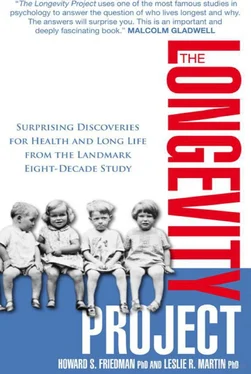A few aspects of school days had clear links to health and longevity: starting formal schooling at a very early age turned out not to be a very good idea for most. Many early starters strayed off the paths that would have led them to become well-adjusted adults who took care of their health. They were less likely to live a long life.
Nevertheless, not everyone was negatively affected by an accelerated academic schedule. Take, for example, Lee Cronbach. A publicly identified Terman participant, Cronbach later became well-known in the fields of educational psychology and psychological testing. When he was only four years old, Cronbach was overheard calculating the unit price of potatoes and comparing the value to be found at one market versus another. 35 35 The Lee Cronbach details are from the “biographical memoirs” Richard J. Shavelson wrote up and published in the December 2003 Proceedings of the American Philosophical Society 147, no. 4.
His mother was anxious for him to excel and enrolled him in second grade soon after his fifth birthday. At eighteen, when most boys were graduating from high school, Lee was graduating from college. Importantly, he went on to marry, have children, and build an illustrious career. He lived to be eighty-five years old. As we later found when we delved deeply into the lives, marriages, and careers of the Terman men and women, those who faced stresses early in life but who bounced back by young adulthood were able to overcome early threats to their later health.
What if you started first grade early, had a rough time in school, were kind of sickly, and never made it to graduate school? Is it time to see your doctor? Not necessarily. Many other factors turned out to be much more important on the paths to long life.
CHAPTER 7
Parental Divorce
Some Were Resilient
Donna’s parents divorced in 1924, when she was thirteen years old. Donna had enjoyed her family life, and the split was hard on her. Although she went on to a successful career in advertising, she never fully recovered from the family breakup. It seemed eventually to affect her health, and Donna died in 1970, at the relatively young age of fifty-nine. We wondered if a story similar to Donna’s played out among other Terman children, and if so, what long-term paths might characterize Donna and the others. How could something that happened at age thirteen lead to death at age fifty-nine?
It is well established that divorce of parents can be harmful for the children, at least in the short term. But what about in the long term, across the decades? Could the child’s experience of divorce be related to mortality risk many years in the future?
Health researchers haven’t much considered or investigated whether divorce of one’s parents and related family problems in childhood would create a significant risk for later heart disease, cancer, and other health threats. Divorce of one’s parents is not a biological risk factor like having high cholesterol in one’s blood. Physicians generally don’t ask their adult patients about it, although pediatricians may worry about short-term threats in the teenage years.
It is very rare to be able to follow children from divorced families for many decades into the future. Little was known about long-term health effects until we began our studies of the Terman participants.
As with Donna, Patricia’s parents had divorced when she was young—only ten years old. James and fidgety Philip, too, came from families with dissolved marriages. Would outcomes be similar for all of them or would there be striking differences? When they grew up, would the divorce be relevant to their own marriages as well?
Parental Divorce and Longevity
Any parent contemplating divorce worries about how the change will affect their children. To gauge those effects on the Terman children, we looked at two events that shatter families—death and divorce. More than a third of the Terman children faced one of these circumstances before they reached age twenty-one.
The death of a parent is certainly traumatic for children, which is why communities and religious groups have developed various rituals and ways of cushioning the blow for survivors. Would the death of a parent have negative long-term effects? We were surprised to find that although the death of a parent during one’s childhood was usually difficult, it had no measurable impact on life-span mortality risk. The children adapted and moved on with their lives.
That was the end of the good news. Although losing one’s parent to divorce might seem better than losing a parent through death, we found the opposite. The long-term health effects of parental divorce were often devastating—it was indeed a risky circumstance that changed the pathways of many of the young Terman participants. Children from divorced families died almost five years earlier on average than children from intact families. Parental divorce, not parental death, was the risk. In fact, parental divorce during childhood was the single strongest social predictor of early death, many years into the future. 36 36 For the complete results of our first study showing that parental divorce predicted mortality risk years into the future see J. E. Schwartz, H. S. Friedman, J. S. Tucker, C. Tomlinson-Keasey, D. L. Wingard, and M. H. Criqui, “Sociodemographic and Psychosocial Factors in Childhood as Predictors of Adult Mortality,” American Journal of Public Health 85, no. 9 (1995): 1237-45.
When her parents split up, Donna and her brother stayed with their mother. Donna continued to go to the same school and occasionally the same Lutheran church. Her mother found a position as an office worker, and there seemed to be little overt disruption in Donna’s life. Around the time when Donna was learning to drive, her mother married again. Soon thereafter, Donna moved on to college, a career, and a family of her own.
Philip’s parents also divorced when he was thirteen. He was close to both his mother and father and later reported that he rarely argued with either of them. By his own account, their split was a significant event in his life. He, too, remained with his mother after the separation, but, unlike Donna’s mother, Philip’s mother struggled to make ends meet. Philip’s tendencies toward anxiety and worry had been exacerbated by the stress of his parents’ divorce and subsequent lack of stability, and so he must have felt some relief as he joined the armed forces and took more direct control over his life. The structure and routine of military life seemed to suit him, and he spent a number of years in the service. Nevertheless, in 1950 he reported to Dr. Terman that he felt he hadn’t lived up to his potential, and he expressed less than complete satisfaction with his work. Philip, too, married and started a family before joining the overseas war effort in 1941. He died of a heart attack in 1974. He was sixty-four years old.
Living Through Divorce, Dying Young
Both Donna and Philip died at a relatively young age. What was linking the experience of parental divorce to higher mortality risk? 37 37 Our follow-up study, investigating the reasons why parental divorce is so important to later mortality risk, was published as J. S. Tucker, H. S. Friedman, J. E. Schwartz, M. H. Criqui, C. Tomlinson-Keasey, D. L. Wingard, and L. R. Martin, “Parental Divorce: Effects on Individual Behavior and Longevity,” Journal of Personality and Social Psychology 73 (1997): 381-91.
Given that both we and other researchers had found that the death of a parent is usually not a long-term health threat, we thought it must be something about the breakup of the family, perhaps the strife and distress.
Читать дальше











